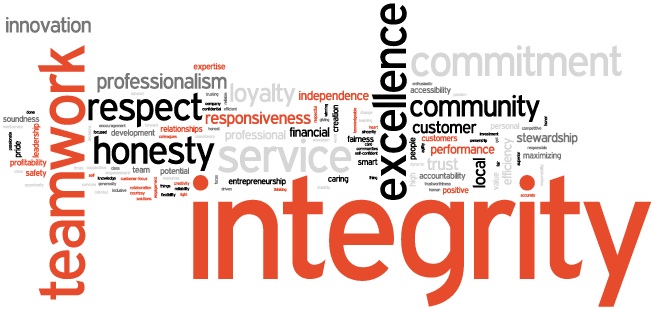THE USUAL SUSPECTS – INTEGRITY, TEAMWORK, HONESTY….

Most organisations have values statements, often framed and presented prominently in the reception area for all and sundry to see. For the most part, these values statements are pretty generic. You can look forward to the usual suspects of: integrity, teamwork, honesty, customer service etc etc.
We know though that Enron had integrity as one of its value statements and that didn’t work out too well for it. So for values to be meaningful, they need to more than just pretty pictures on a wall.
HOW DO VALUES HELP?
Taylor notes that values:
“Guide us on what to pursue or prefer. They impact what we want from life and how to engage with others.”
In the workplace, this plays itself out by helping employees know what is important. Values help in decision making by showing what’s key in the organisation, and in the way that the organisation goes about doing its business. Values help decide the strategic and operational direction of an organisation.
DEFINING VALUES THROUGH BEHAVIOURS
Some organisations have taken the generic value statements and gone a step further by illustrating the sort of behaviours you’d expect to see if the employee was living out those values. This can be helpful. After all, my definition of customer service may be very different to yours.
Beyond those definitions though, I think the most helpful way to articulate values is in a hierarchy. In what order do the values fall? Let’s say an employee has to make a decision to either provide great customer service or save the company money at all costs. These values can (and usually are) in conflict. So which one does the employee choose?
EVEN OVER STATEMENTS
This great article by NOBL suggests the use of “even over” statements. They define these as:
One tool we recommend is an Even Over Statement. These are simple phrases that teams can pin up on a wall and use as strategic touchstones in their work.
Examples:
- Profit margin even over revenue growth
- Sustainability even over profitability
- Innovation even over predictability
- Best in class customer service even over best in class product features
- Star teams even over star players
- Taking a real lunch break even over catching up on emails while you eat at your desk
Now we’re talking. If we define values in ways that show both how they’re lived (behaviours) and how important they are (even over statements), then we are going some way to helping an employee actually use the values beyond something to stare vacantly at during meetings.
Note that NOBL go on to say: “Pro Tip: An Even Over Statement should feel like it costs you something. Because of opportunity costs, every choice you make is a sacrifice. Therefore, the hallmark of a strong Even Over Statement is how difficult the tradeoff feels between the designated choices. For example, ‘being rich even over being poor’ is a bad Even Over Statement because it in no way forces a choice.”
SOME THINGS TO PONDER
- Does your organisation have value statements?
- Are they lived? By this I mean, can an employee tell you where they’ve used a value to help guide them in their decision making, behaviour or planning?
- What hierarchy would your value statements fall into? Note – this can be a confronting discussion, but better to be up front about what’s important than hope that employees just intuitively understand.
WANT MORE?
AND MORE STILL ?
If the above has whetted your appetite, and you’re keen for more, here are some ideas:
Does leadership interest you? Sign up to my FREE seven day “Be a Better Boss Challenge” by clicking here.
Click here to buy my book on reinventing your leadership style.
Let’s chat.. Click here to get in touch.
Do you want some help in meeting your goals for the new financial year? Sign up to the permission to dream programme, by clicking here.
Want to read more? You can read any of the 300+ blog posts on this site, by clicking here. And if you’d like to read posts specifically on culture, you can click here.
See you soon,


